All that you need to know about baby’s first steps. We will look at key walking milestones and activities that can help with how to teach a baby to walk.
So, when do babies start walking? It is different for every child. Trust us, your baby wants to walk. And he has the innate drive to do so.
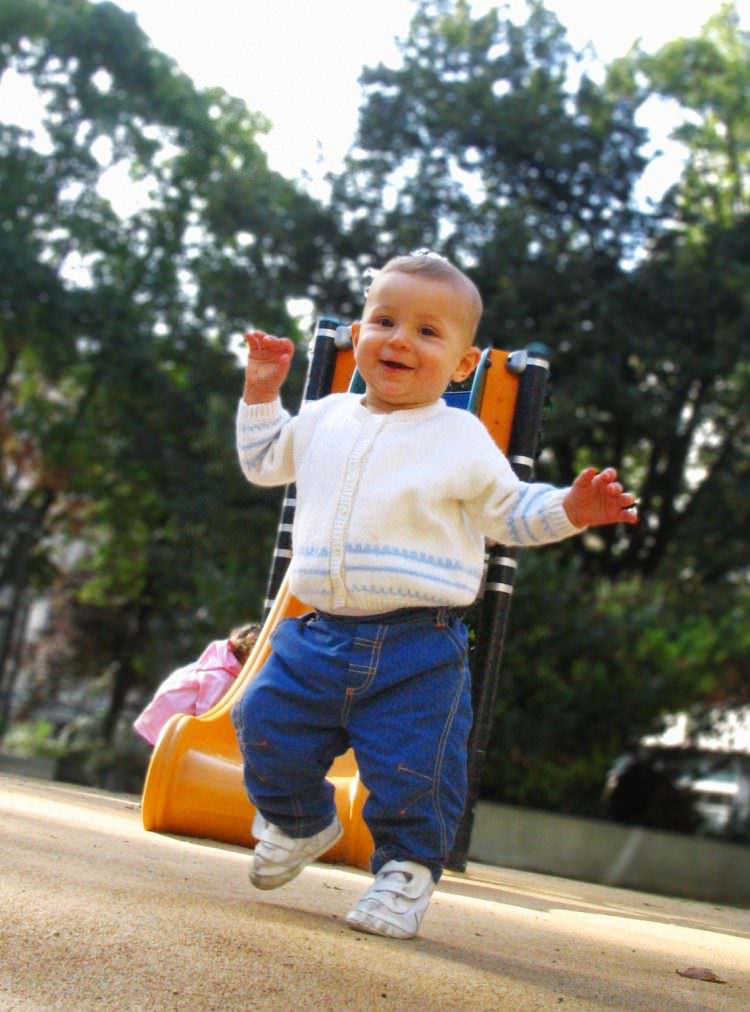
Understanding Developmental Milestones
Like every part of your baby’s development, there are milestones that give a general idea of what signals to expect at every stage that your baby is learning to walk. Typical stages of baby physical development are scooting, pulling up, crawling, walking with help, standing without help, and finally, walking.
You can read more about baby development milestones here
Is My Baby Strong Enough to Walk?
Your baby’s physical development can have an impact on when your baby learns to walk. It can also have an impact on your ability to help them walk.
Muscle Strength
A child’s muscle tone and strength can have a major impact on his ability to walk, especially his or her gross motor development. Tummy time is one good way to increase your baby’s muscle strength. During your infancy postural control (your infant’s ability to balance the head, to sit, to stand and to walk) is very important and plays a big role in your baby’s physical development.
What If My Baby Has Never Crawled?
Not all babies crawl. Instead, many may use their bottoms to scoot or slide on their bellies. This usually has nothing to do with a lack of muscle strength or ability. They simply skip the crawling stage and start walking.
If you think your baby is walking strange, limping, or is walking on his or her knees or toes, then it may be wise to seek an evaluation by a physical therapist who specializes in early intervention.
Baby Walkers: Yes or No?
It has not been proven that walkers help babies learn to walk any sooner. There is actually more evidence that walkers may hinder your child’s ability to learn to walk by weakening muscles and causing toe walking.
How Will I Know That My Baby Is Ready to Start Walking?
It is helpful to know the signs baby is ready to walk. Some of the signs to watch for to let you know when your child is ready to start walking include climbing stairs while using his or her hands, standing without support, and pulling himself up while holding onto a stationary object. Just keep in mind that all babies learn to walk at his or her own pace.
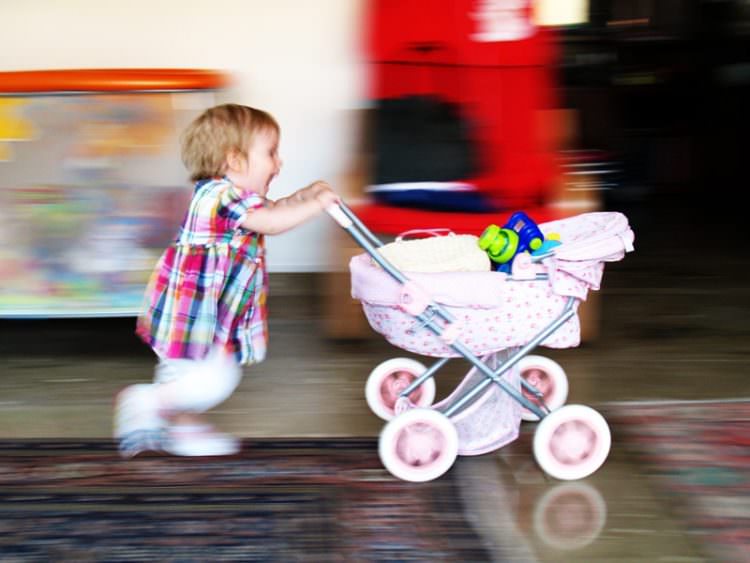
Early Mover
Some babies start walking as early as 9 months. If so, he or she may have gone through the developmental milestones quicker than the parent can keep up. You should note that many early walkers tend to be accident-prone.
Late Bloomer
Are you worried because you have a 15 month old not walking? Though you may think that your baby should be walking independently by now, the average age babies walk is usually between 9 and 18 months. If your baby is on the latter end of that spectrum, these so-called “late bloomers” may be more cautious than their counterparts who learn to walk at an earlier age.
How to Encourage Your Baby to Walk
At ADAM & Mila, we aspire to provide both practical and easy ideas for fun and educational activities to help you teach your baby to walk. Take a look at a few:
- Start low. Place your coffee table, couch, or any other low furniture close together to encourage your baby to let go and walk short distances.
- Come to mama. Stand or kneel about one foot in front of your baby and hold out your hands. This will entice your little one to take a step towards you.
- Free those piggies. Shoes often are not needed until your baby starts walking regularly and independently. Allowing your child to walk barefoot indoors will improve coordination and balance.
You can find many more Baby & Toddler Activities here
Walking Along Furniture
Development Milestone emerges from age 9 to 13 months.
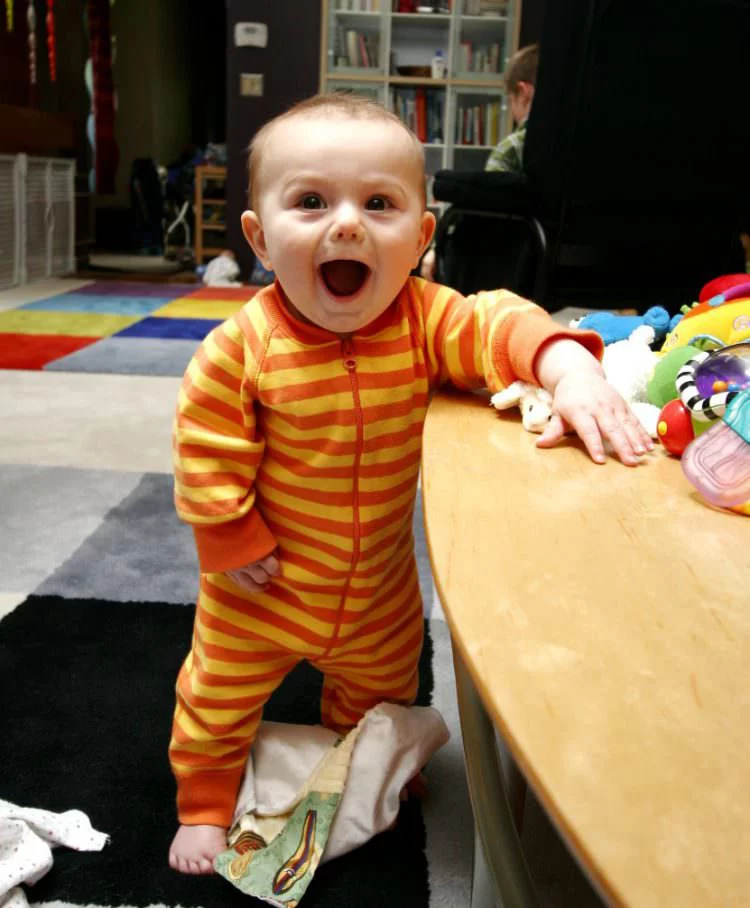
At this age, your child will be able to move sideways around furniture. He or she can now do this by holding on with one or both hands, without using the piece of furniture for body support.
Pivots to Pick Up Objects
Development Milestone emerges from age 10 to 11 months.
Now, when your little one spots her favorite toy behind her, your soon-to-be toddler can twist her body around and pick it up.
Moves on Hands and Feet
Development Milestone emerges from age 10 to 12 months.
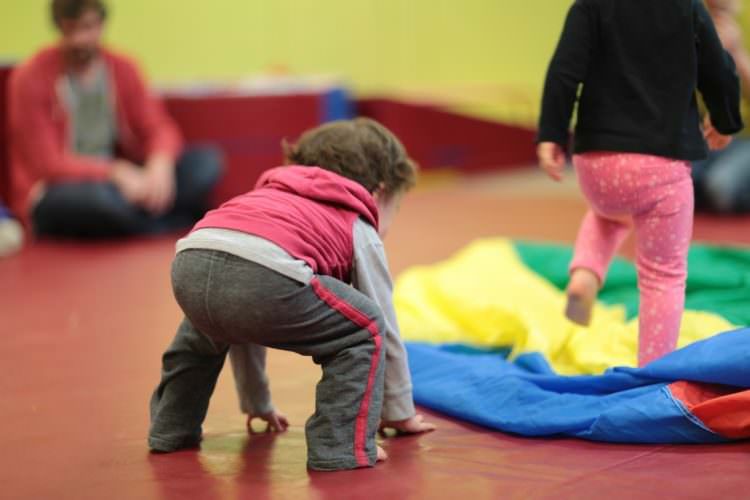
If you see your child walking on his hands and feet with his bottom in the air, don’t be alarmed. This is what is sometimes referred to as “bear walking” and it is a perfectly normal part of your baby’s development. This walking milestone is a big sign that he is ready to transition to walking, but not all children will go through this.
Walk Upright If Held
Development Milestone emerges from age 10 to 12 months.
Now, your soon-to-be toddler can walk with your help. Try walking on your knees while holding both of your child’s hands at his or her shoulder level.
Lifting One Foot to Stand
Development Milestone emerges from age 11 to 12 months.
At this age, your child can pull himself up easily onto low furniture, like a couch, chair or coffee table. But this takes more skill than just standing up. He must go through a process from sitting to kneeling then one leg kneeled and one leg up.
Kneeling Without Support
Development Milestone emerges from age 11 to 13 months.
Your child can now bear his full weight on his legs. This makes it easier for him to get into a kneeling position without help. Try putting a toy about a foot out of reach above his head and watch him go for it!
Related Activities
Walks Holding Hand
Development Milestone emerges from age 11 to 13 months.
With your help, your toddler can take steps. All she needs is for you to hold just one of her hands. Remember to always do so at her shoulder level.
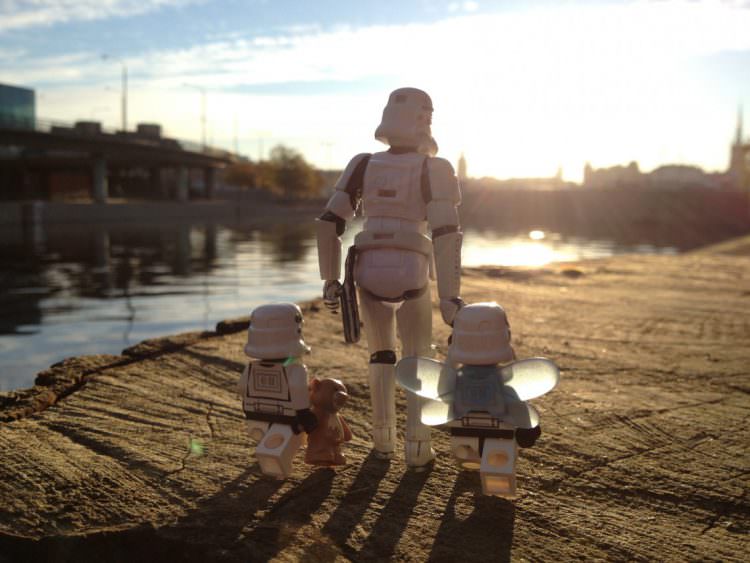
Few Steps Alone
Development Milestone emerges from age 11 to 14 months.
Yay! Your baby is finally beginning to walk independently. Initially, it may only be a few steps forward and look more like a Frankenstein walk (arms straight out to the side; feet wide and spread apart).
Falling to Sitting
Development Milestone emerges from age 12 to 14 months.
This stage should be more accurately described as plopping down rather than a simple fall. When your child gets tired, he or she will simply plop down somewhat abruptly to the sitting position. But don’t worry; the abruptness should lessen as your child gains more control.
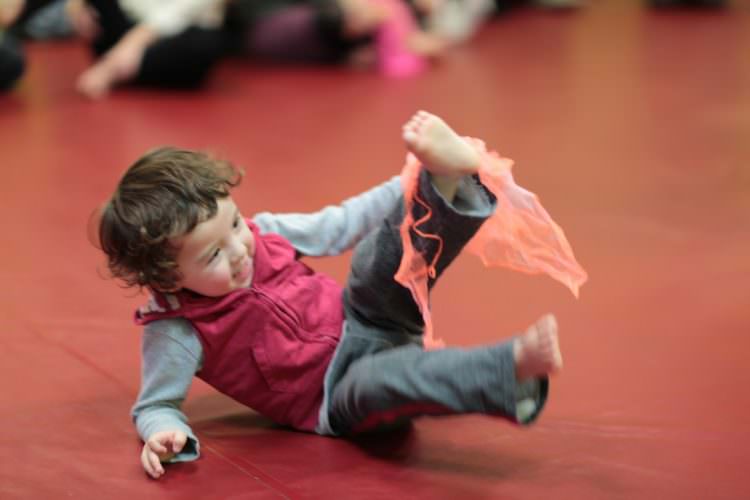
Lying to Standing
Development Milestone emerges from age 12 to 15 months.
This is the stage when your toddler should be able to go from lying to standing with relative ease. It may require some transitional moves to get there. For example, rolling from the back to the side, then from side to hands, and hands to knees. Then from all fours to feet. This skill may be easier to notice after a diaper change.
Crawl Up Stairs
Development Milestone emerges from age 13 to 15 months.
Now your little will start to tackle stairs. At this stage, he will likely accomplish this by using a combination of knees and hands. Or he might do what is called “hitching,” which is sitting on the steps then pushing up on his bottom to the next step.
Walks Independently
Development Milestone emerges from age 13 to 15 months.
Now, the fun begins! Your baby is no longer a baby and walks independently. She can turn, start, and stop without losing her balance. If she is a beginner, she may still creep. She may also find it difficult to walk on uneven surfaces, longer distances or at a rapid pace. Otherwise, watch her go!
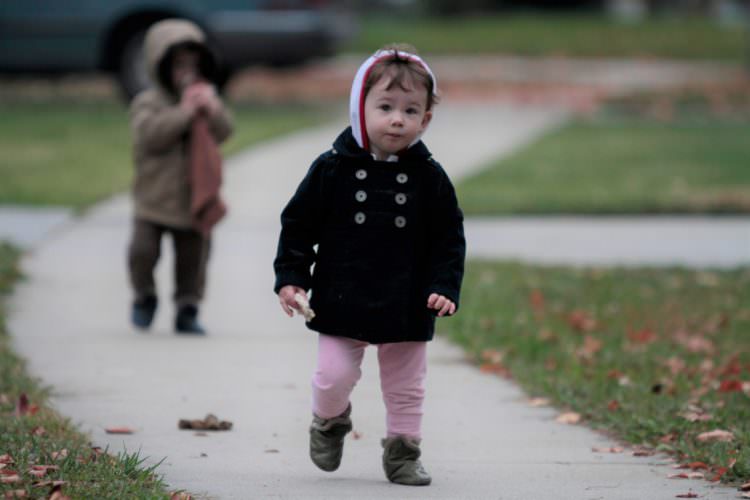
Picks Up Toy While Standing
Development Milestone emerges from age 13 to 15 months.
Since your toddler is walking independently now, it should not surprise you that he or she can also stop to retrieve dropped objects without losing balance.
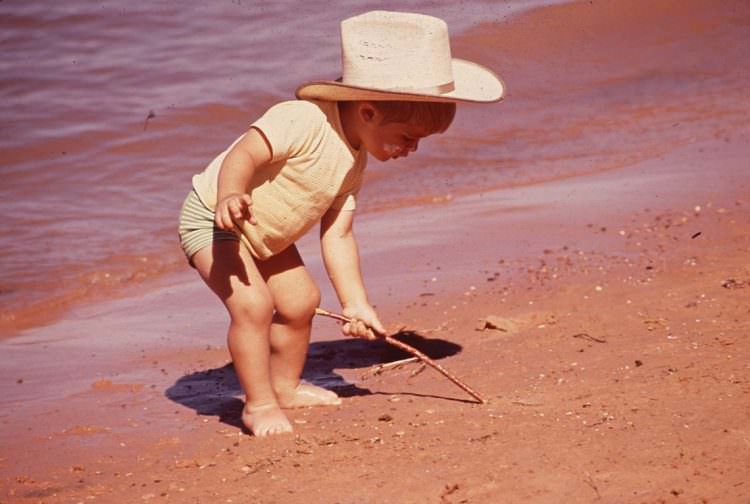
What age your baby learns to walk has nothing to do with his or her intelligence, but has more to do with personality. The truth is, more active babies may walk sooner and more easy going babies may learn to walk a bit later. But even that is not set in stone.
Developmental milestones are a great way to track your child’s walking progress. Every parent worries that their child is not reaching reaching those milestones fast enough and it is perfectly normal. If you are worried, there is always more that you can learn about what you should do.
All in all, what is most important is that you understand what the developmental milestones are and have helpful learning activities in mind to target them. Believe us, your child will greatly benefit if you do.
We hope that this article was helpful to you. We would love to know what you think! Please share our article with others who might benefit from it.





My grandson started walking a few steps between furniture at nine months so we thought he would walk early , however , he is going on fifteen months and will walk in short spurts only and is very coordinated, can climb on and off furniture stoop to pick up toys and is very agile . He will however mainly walk tightly clasping our fingers or even a toy . What is holding him back from walking independently ?
Hi Mary, it sounds like your grandson is doing pretty well. Learning to walk is a process – from what you describe it seems your grandson is moving well along in that process. However do make sure to ask his pediatrician at the next well baby checkup, or take him to a Physical Therapist for a full evaluation just to be safe.
The PT would be able to advice you on any specific exercises you can do with him to support his development.
Do remember that it is not a competition, no one was born with the ability to walk but most of us figure it out eventually. So do make the checkups to give you peace of mind, and then just enjoy the process.
My baby is 17 months old,but she can only crawl and also hold table as a support to stand.she can also claim table to pick things.she cannot walk independently
Hi Bulus, I can certainly empathize with your concern. Walking is such a major milestone that will mark a big change in your daughters daily life. The good news is that this is not the only milestone, and it sounds like your daughter has been hitting all the previous ones and is ready to start walking any day.
It would make sense at this point to talk to a physical therapist, he/she will be able to provide a detailed assessment of your child’s gross motor skills and give you some targeted activities to do at home. It might not take much additional effort, or it might, either way, no harm in getting some good pointers from a professional.
Love this article! I find this really helpful, especially for a first-time mom like me. I will have to bookmark this. My baby has recently turned two-months-old and she’s already able to turn sideways without my help. I’m excited to see my baby girl to start walking.